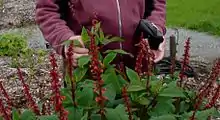Salvia confertiflora
Salvia confertiflora, the Sabra spike sage,[1] is a species of flowering plant in the family Lamiaceae, native to Brazil. This herbaceous perennial reaches 1–1.5 m (3.3–4.9 ft) in height, and 10–50 cm (3.9–19.7 in) spread in one season, becoming shrubby at the base with age.[1]
| Salvia confertiflora | |
|---|---|
 | |
| Scientific classification | |
| Kingdom: | Plantae |
| Clade: | Tracheophytes |
| Clade: | Angiosperms |
| Clade: | Eudicots |
| Clade: | Asterids |
| Order: | Lamiales |
| Family: | Lamiaceae |
| Genus: | Salvia |
| Species: | S. confertiflora |
| Binomial name | |
| Salvia confertiflora | |
The dark green leaves, with a yellow undertone, are about 7 in (18 cm) long by 3.5 in (8.9 cm) wide, with serrated edges, and with velvety red-brown hairs on the petiole and stem of the new leaves. The leaves bear a sage scent. The inflorescences are covered with velvety red-brown hairs, with the stems and the calyx also having a red-brown color. The 0.5 in (1.3 cm) flowers are orange-red, and very profuse, explaining the epithet confertiflora, or "crowded with flowers". The plant grows so large that it needs staking and protection from wind in gardens.[2]
The plant is cultivated as an ornamental in temperate and tropical horticulture. As it does not tolerate freezing temperatures, it requires protection in cold temperate zones, and a sheltered position in full sun.[1]
Notes
- "Salvia confertiflora". www.rhs.org. Royal Horticultural Society. Retrieved 17 September 2020.
- Clebsch, Betsy; Barner, Carol D. (2003). The New Book of Salvias. Timber Press. p. 86. ISBN 978-0-88192-560-9.
.JPG.webp)